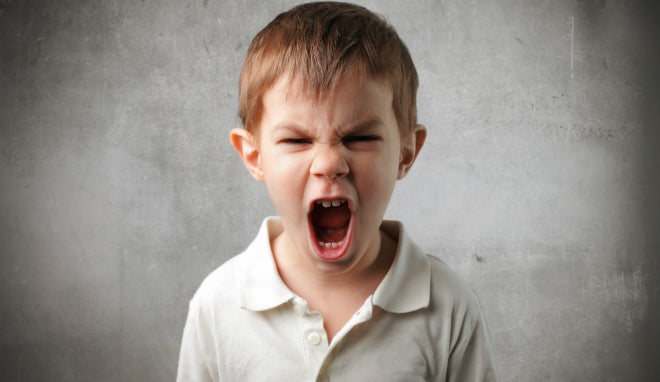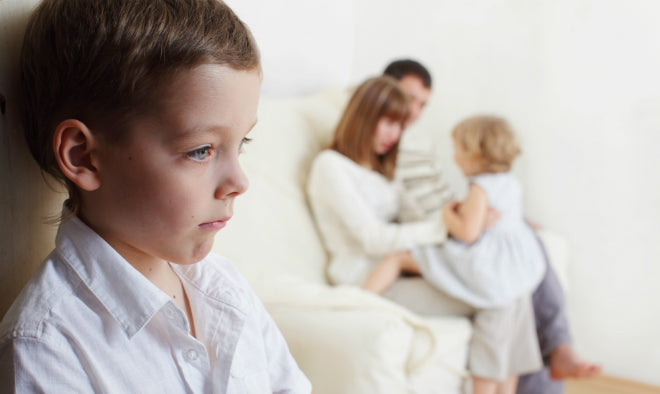" Causes and solutions "
Tantrums, hitting siblings, shouting - most parents are familiar with aggressive behavior in children. But what happens when aggression becomes an everyday problem or increases permanently? What behavior is normal in children?
The right way to deal with aggressive behavior in children
Pushing around, biting here and there or even hitting are normal behaviors in children. The form of aggression displayed by children depends primarily on their age. An infant as young as 6 months can vent his anger, but without any intention of harm. From around the age of three, tantrums are often directed at parents or peers. To a certain extent, this is also completely normal and no cause for concern. As a rule, toddlers in particular make up quite quickly after exchanging some aggression and injuries are also an exception. This is mainly due to the fact that neither babies nor toddlers act with the intention of harming others.

Aggressive behavior in the defiant phase or beyond?
Aggressiveness as a coping mechanism
However, some toddlers and kindergarten children repeatedly display particularly aggressive behavior in certain situations. Physical confrontations are literally used as a coping mechanism in every conceivable situation. The little ones do not have the intention of deliberately bullying weaker children, but often seek out arguments with much older children. In these toddlers, the cause seems to lie in the nervous system: The nervous system is not yet sufficiently capable of recognizing and reacting to different impulses. They always seem to be in "fight mode" instead of considering taking flight. It is essential that these children learn that ignoring or running away can also be adequate techniques for dealing with unpleasant conflicts. At the same time, however, it may also be a matter of improving the little ones' social skills.
Aggressive behavior: Offspring need help
Regardless of the cause, as a parent you can help to reduce your child's negative behavior with behavioral training. A few measures can help:

Help your children cope with aggression
Relaxation
If a young child is aggressive, he or she is struggling with enormous mental and physical tension. This restlessness can only be reduced with a lot of training. Relaxation exercises, progressive muscle relaxation or autogenic training can release the blockages in your child and thus successfully contribute to a reduction in aggression. Daily exercises are useful here. For example, you can listen to a relaxation CD with your child every evening as a ritual. But creative activities are also an excellent way to achieve more inner peace. With some craft materials, e.g. craft beads you can make pacifier chains for example.
Alternative action
Aggressive offspring often do not understand the signals that others are sending them. They must therefore learn to better recognize and interpret other people's behaviour patterns. In addition, it is important that various alternatives are trained for the quarrelsome behavior. This not only teaches your child to interpret situations better, but also to react to them correctly. Even the youngest children can train what appropriate behavior should look like through simple role-playing games. Authoritarian mediation, on the other hand, has no learning effect.

Aggressive reactions due to misunderstanding the actions of others
Strengthen self-esteem
The self-confidence of aggressive children is usually poorly developed. They therefore try to assert themselves against others through conspicuous behavior and want to assert themselves through aggression. An aggressive toddler always needs praise and encouragement from parents and the environment. It must learn that only positive behavior is rewarded.
Learn self-control
A quick-tempered child usually does not believe that words can make a difference. Up to now, all problems have been solved by physical superiority or aggressive behavior. It will therefore be a completely new experience for your child to learn that they can assert themselves using their mental abilities alone. When learning self-control, it is very important to be consistent. Only if you do not tolerate any misbehavior and keep encouraging your little one to exercise self-control can he fully engage in the new experience. Role play can also help to achieve this goal.

Help your child to learn self-control
Train empathy
It is not easy to judge situations objectively. You have to be able to put yourself in the other person's shoes in order to do this. Aggressive children lack this ability. However, empathy can be trained with your help. Deal with your feelings and those of your pet. What is the right way to react when you are afraid or sad? Encourage your little one to look at the facial expressions of other people. What feelings can you recognize from facial expressions? Talk to your little one and show empathy yourself.
Comparison of aggressive behavior in girls and boys
Boys usually express aggression in a completely different way to girls. While aggressive boys get more attention because they often physically confront their opponents, girls are more likely to get into heated arguments through verbal conflict. Both girls and boys with aggressive behavior need a lot of support from their parents so that they can learn better social behavior and solve problems in the future without resorting to violence and bad language.










